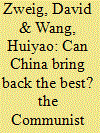|
|
|
Sort Order |
|
|
|
Items / Page
|
|
|
|
|
|
|
| Srl | Item |
| 1 |
ID:
173264


|
|
|
|
|
| Summary/Abstract |
Reverse migration has mitigated the brain drain for many Asian countries. But can developing countries actually bring back their best overseas talent? How can this studymeasure the quality of that talent? And, if the best are not returning, why not? Is the ‘institutional culture’ within the scientific and academic institutions the cause? The authors address these questions by comparing full-time and part-time returnees in three national programs, using each scholar’s h-Index, the impact factor of the journals in which they publish, and the annual number of publications by each researcher. The findings show that, circa 2012–13, the strongest researchers returned only part-time. Second, returnees to the Chinese Academy of Sciences were weaker than returnees under national programs at universities. And third, universities whose presidents reformed the institutional culture at the school attracted better overseas talent than other universities. The findings, then, show that resistance to institutional change can undermine a state’s effort to promote its research and development while domestic reform can promote that endeavour.
|
|
|
|
|
|
|
|
|
|
|
|
|
|
|
|
| 2 |
ID:
124642


|
|
|
|
|
| Publication |
2013.
|
| Summary/Abstract |
For some developing countries, the international flow of their human talent in the recent decade was more of a "reverse brain gain" than a "brain drain." China, too, joined the group of states whose students, after studying abroad, now found sufficient opportunity and an acceptable quality of life back home to make returning after graduation a reasonable option. Still, China had not succeeded in bringing back the very best scientists and academics. To remedy this problem, the Organization Department of the Chinese Communist Party became actively involved in the recruitment process. The key programme was the "1000 Talents" Plan, introduced in 2008 by Politburo member Li Yuanchao, who had a visionary perspective on reverse migration. This programme has succeeded in bringing back entrepreneurs full time; but it has not attracted the very best of the Chinese scientists and academics who studied and lived overseas to return fulltime.
|
|
|
|
|
|
|
|
|
|
|
|
|
|
|
|
|
|
|
|
|